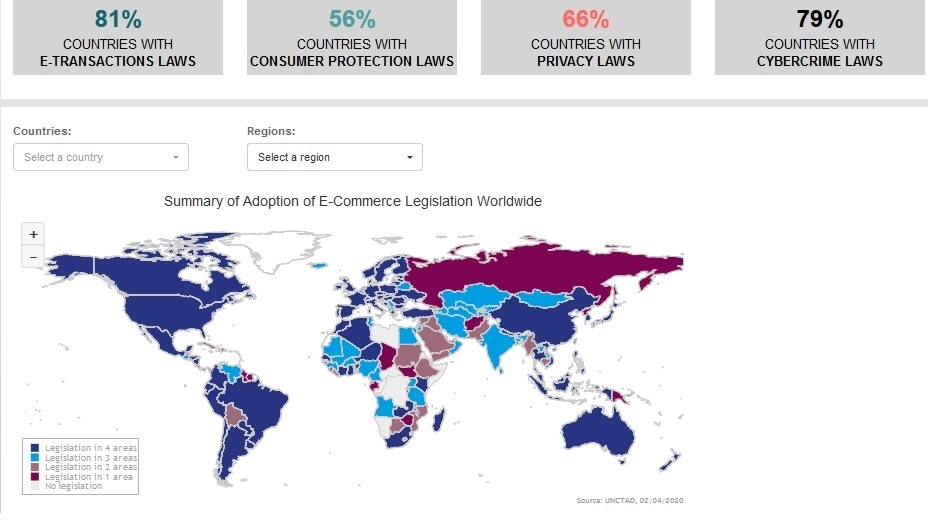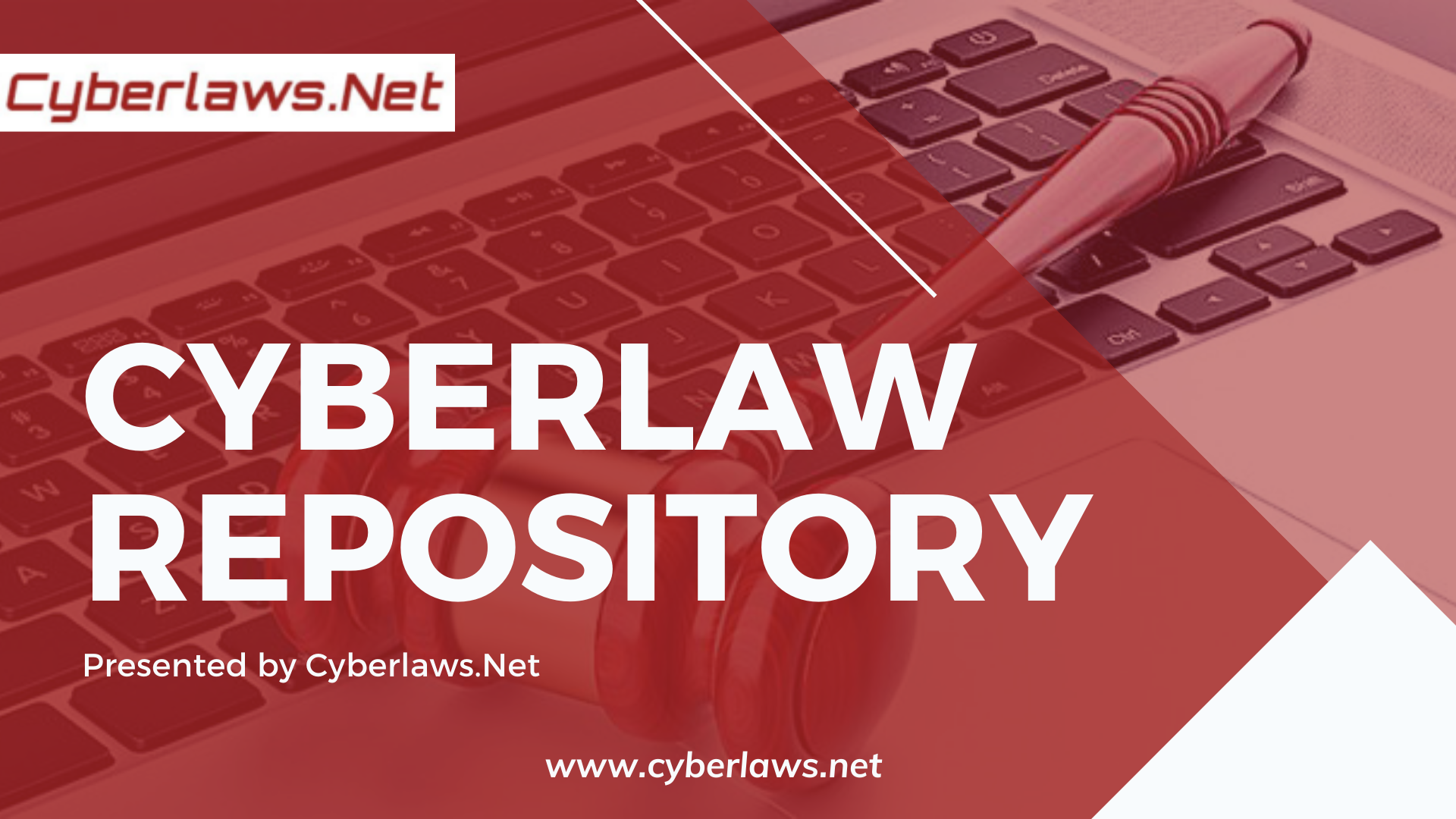Source: www.unctad.org
REPOSITORY
E-commerce Development in Ghana/West Africa
- Data Protection Act (Act 843),
- Data Protection Commission set up
- Electronic Transactions Act (Act 772)
- CERT-GH set up with support of ITU
UNITED STATES OF AMERICA
- S. Safe Web Act: This Act provides the FTC with a number of tools to improve enforcement regarding fraudulent spam, spyware, misleading advertising, privacy and security breaches, and other consumer protection matters, particularly those with an international dimension. Among other things, the Act allows increased cooperation with foreign law enforcement authorities through confidential information sharing, provision of investigative assistance, and enhanced staff exchanges. In certain limited circumstances it enables the FTC to obtain information in domestic or foreign consumer protection matters from third parties without tipping off investigative targets.
- Cybersecurity Information Sharing Act (CISA)– Its objective is to improve cybersecurity in the United States through enhanced sharing of information about cybersecurity threats, and for other purposes. The law allows the sharing of Internet traffic information between the U.S. government and technology and manufacturing companies. The bill was introduced in the S. Senate on July 10, 2014, and passed in the Senate October 27, 2015
- Cybersecurity Enhancement Act of 2014: It was signed into law December 18, 2014. It provides an ongoing, voluntary public-private partnership to improve cybersecurity and strengthen cybersecurity research and development, workforce development and education and public awareness and preparedness.
- Federal Exchange Data Breach Notification Act of 2015:This bill requires a health insurance exchange to notify each individual whose personal information is known to have been acquired or accessed as a result of a breach of security of any system maintained by the exchange as soon as possible but not later than 60 days after discovery of the breach.
- National Cybersecurity Protection Advancement Act of 2015:This law amends the Homeland Security Act of 2002 to allow the Department of Homeland Security’s (DHS’s) national cyber security and communications integration center (NCCIC) to include tribal governments, information sharing, and analysis centers, and private entities among its non-federal representatives.[1]
The United States has several other legislations aimed to secure data in the cyberspace:
– 1996 Health Insurance Portability and Accountability Act (HIPAA)
– 1999 Gramm-Leach-Bliley Act
– 2002 Homeland Security Act, which included the Federal Information Security Management Act (FISMA)
These three regulations mandate that healthcare organizations, financial institutions, and federal agencies should protect their systems and information. However, these rules are not foolproof in securing the data and require only a “reasonable” level of security.[2]
CYBER LAWS IN ASIA
- INDIA
Information Technology Act, 2000
India has adopted the Information Technology Act, 2000 (No. 21 of 2000) being the Cyber Law in India aimed at promoting e-commerce. Further the Information Technology Act, 2000 (No. 21 of 2000) has been amended by the the Information Technology (Amendment) Act, 2008 (No. 10 of 2009). It includes penal substantive rules, regulations and also procedural rules.
The Personal Data Protection Bill, 2018
National Cyber Security Policy, 2013
Digital Information Security in Healthcare Act
Draft National E-Commerce Policy
- MALDIVES
Maldives does not have any officially recognized regulation pertaining to Cyber Law.
Maldives has signed a Memorandum of Collaboration against Malicious Activities in Cyberspace with Japan Ministry of Information and Communication.
(http://www.itu.int/en/ITU-D/Cybersecurity/Documents/Country_Profiles/Maldives.pdf)
National Security Policy 2012
http://www.defence.gov.mv/english/images/publications/National_Security_Policy_2012.pdf –
- BANGLADESH
Bangladesh Telecommunication Act, 2001.
Bangladesh Information and Communication Technology (ICT) Act, 2006
GOVERNMENT OF BANGLADESH INFORMATION SECURITY MANUAL
National e-Commerce Policy-2017
E-Mail policy-2017
- BHUTAN
Bhutan does not have any specific cybercrime legislation but it has adopted the Bhutan Information and Communication Media Actprovides functions, responsibilities and powers of the Ministry of Information and Communications; the establishment of the Bhutan Infocomm and Media Authority; provision of ICT facilities and ICT services; provisions relating to radio communications; provisions relating to media issues; provisions relating to cyber issues such as e-governance, e-commerce, consumer protection and online privacy; and offences, penalties and legal proceedings.
- CHINA
Regulations on Safeguarding Computer Information Systems, Feb. 1996
(http://fas.org/irp/world/china/docs/computer_code.htm)
Article 1- These regulations have been formulated to safeguard computer information systems, to promote the application and development of computers, and to ensure smooth progress in socialist modernization.
Cybersecurity Law of the People’s Republic of China
The Cybersecurity Law came into effect on 1 June 2017, and standardizes the collection and usage of personal information. Similar to India’s Data Protection Bill 2018, it emphasizes on privacy and data security,[3] and also requires foreign organisations to store critical data domestically.
- INDONESIA
Indonesia does not have any specific Cyber Law legislation but it has adopted Law of the Republic of Indonesia Number 11 of 2008 Concerning Electronic Information and Transactions,
Regulation Number 82 of 2012 Concerning Electronic System and Transaction Operation http://rulebook-jica.ekon.go.id/english/4902_ PP_82_2012_e.html.
Law on Consumers’ Protection 1999 http://www.cipatent.com/consumersprotectionlaw.Pdf
Pornography Law 2008.
- MALAYSIA
Computer Crimes Act 1997 of Malaysia:Part II of the Computer Crimes Act 1997 of Malaysia deals with offences. It includes penal substantive rules, regulations and also procedural rules.
Electronic Government Activities Act 2007
Personal Data Protection Act 2010
Communications and Multimedia Act 1998
- MYANMAR
Myanmar does not have any specific Cyber Law legislation but it has adopted the following
Electronic Transactions Law( The State Peace and Development Council Law No. 5/2004 ) The 12th Waxing of Kason 1366 M.E. (30th April, 2004)
Computer Science Development Law 1996
- NEPAL
Nepal does not have any specific Cyber Law legislation but it has adopted The Electronic Transaction Act, 2063read with the Electronic Transaction Rules 2064 -Nepal’s first cyber law. The Chapter 9 of the Electronic Transaction Act, 2063 specifically deals with various cybercrimes. It includes penal substantive rules, regulations and also procedural rules.
- SINGAPORE
Singapore does not have any officially recognized national legislation pertaining to cyber law. But it has adopted the following
Electronic Transactions Act (ETA) (Cap 88)– first enacted in July 1998 to provide a legal foundation for electronic signatures, and to give predictability and certainty to contracts formed electronically.
The Computer Misuse and Cybersecurity Act)
Spam Control Act
Personal Data Protection Act 2012 of the Singapore
Consumer Protection (Fair Trading) Act 2003
MDA Internet Code of Practice
- THAILAND
Thailand does not have any specific Cyber Law legislation but it has adopted Computer Crime Act B.E 2550 (2007) of Thailandand the Computer Crime Act B.E 2550 (2007)– These deal with various cyber crimes. It includes substantive rules, regulations and also procedural rules.
Electronic Transactions Act 2001
Consumer Protection Act 1979
(http://www.asianlii.org/th/legis/consol_act/cpa1979246/).
Unfair Contract Terms Act 1997
(http://www.samuiforsale.com/law-texts/unfaircontract-terms-act.html (unofficial translation).
- BRUNEI DARUSSALAM
Electronic Transactions Act 2008
Unfair Contract Terms Act 1999
Authority for Info-communications Technology Brunei Darussalam Order 2001
- CAMBODIA
Regulations on Registration of Domain Names for Internet under the Top Level “kh” http://www.gocambodia.com/KHDomainReg/ Regulation_on_Reg.asp.
- THE LAO PEOPLE’S DEMOCRATIC REPUBLIC
Electronic Transactions Law 2012.
Ministry of Information and Culture, Special Provisions (416/IC) for Control of the Content and the Information and Data Obtained via the Internet System.
THE PHILIPPINES
Cybercrime Prevention Act 2012
Alternative Dispute Resolution Act 2004
VIET NAM
Decree No. 26 providing detailed regulations on the implementation of the Law on E-transactions on digital signature and digital signature certification services http://www.moj.gov.vn/vbpq/en/Lists/Vn%20bn%20 php%20lut/View_Detail.aspx?ItemID=4172.
Management and Use of Internet Services Decree 2001
Law on E-Transactions 2005 (in English)
Law on Protection of Consumers’ Rights 2010 (in English)
[1] All laws from – https://www.appknox.com/blog/united-states-cyber-security-laws
[2]https://www.appknox.com/blog/united-states-cyber-security-laws
[3]https://assets.kpmg/content/dam/kpmg/cn/pdf/en/2017/02/overview-of-cybersecurity-law.pdf

